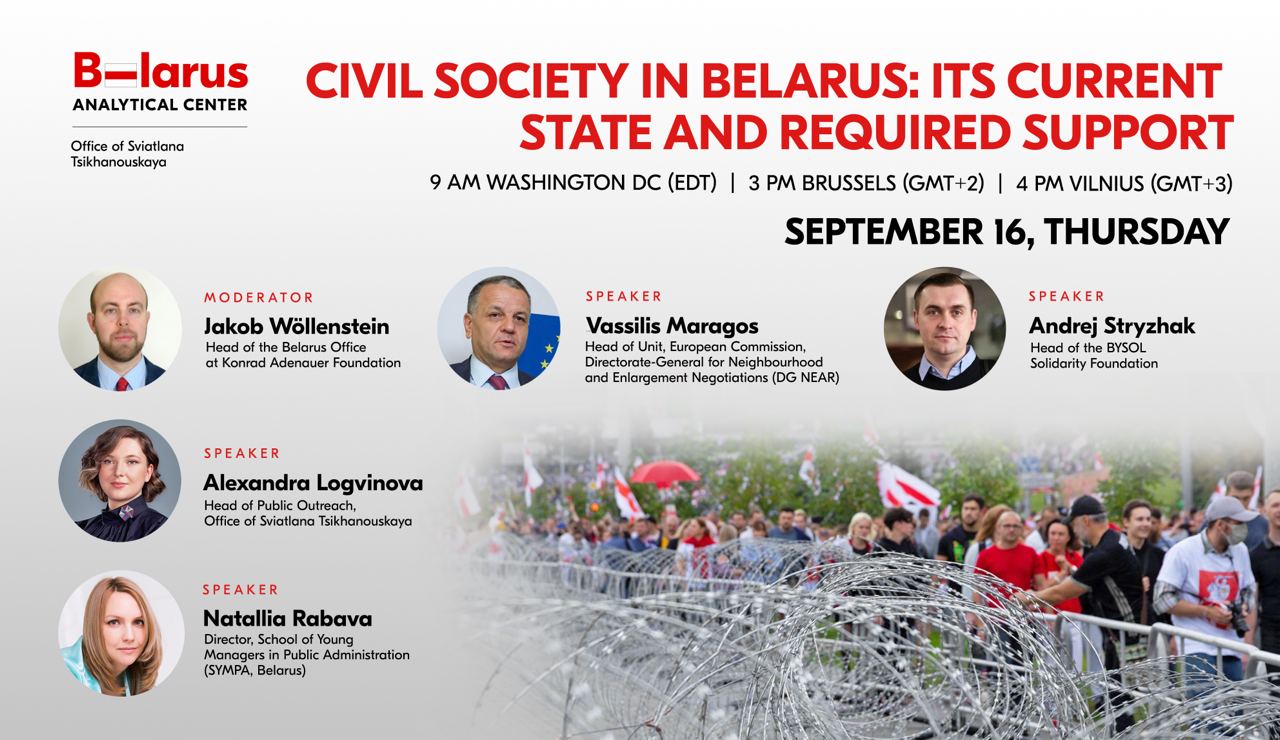The Analytical Center of Sviatlana Tsikhanouskaya's Office holds weekly expert discussions online with international experts on Belarus’ pressing matters. On September 16, 2021, we discussed the topic “Civil society in Belarus: its current state and required support”.
Head of Public Outreach of Sviatlana Tsikhanouskaya's Office Alexandra Logvinova, Head of Unit, European Commission, Directorate-General for Neighbourhood and Enlargement Negotiations (DG NEAR) Vassilis Maragos, Head of the BYSOL Solidarity Foundation Andrej Stryzhak, Director, School of Young Managers in Public Administration (SYMPA, Belarus) Natallia Rabava presented their visions and idea about the current state and challenges Belarusian civil society face with today. Head of the Belarus office at Konrad Adenauer Foundation, Jakob Wöllenstein, moderated the discussion.
In the context of the presidential election in 2020 in Belarus, there was a boom in civil society development. Energized by the electoral campaign, Belarusians have launched scores of new civil initiatives, local communities, various professional associations in Belarus and other countries. In parallel, there are civil society initiatives and organizations (CSOs) in Belarus that have successfully functioned for a long time.
However, civil society in all its forms has become one of the main targets of the regime’s repressions. Many activists have been fined, arrested, or subjected to other kinds of pressure. Some of them had to leave the country and continue their work from abroad. In the runup to the first anniversary of the 2020 election, the authorities conducted massive repressions against activists and CSOs. At present, the majority of well-known Belarusian CSOs are in the process of legal termination. We see how the regime struggles to portray civil society as something like the “fifth column” of the West. In this situation, it is crucial to support Belarusian civil society in various forms and activities.
The experts came to the following conclusions:
- An increased level of solidarity and trust between Belarusian people and organizations is a positive trend. Many people have left their stereotypes about politics and civic activism. The Belarusian diaspora has become an important factor in the recent developments in the country.
- A new generation of grassroots civic initiatives emerged. These are new projects and organizations which perform their activities in innovative forms. New professional associations (medics, workers, athletes, cultural activists, etc.) and local initiatives are forming. New mobilization plans like the Peramoga Plan and the Workers’ Movement were created.
- The “Black July” of 2021 for Belarusian civil society was when almost all existent CSO became a target of the regime’s crackdown in one month. However, despite the repressions and the fact that most organizations are now either deprived of legal status or forced to leave Belarus and operate from abroad, they continue to function. The loss of legal status is a negative development, but many organizations may continue their activities without it. Meanwhile, the legal status as such shouldn’t be an obstacle to getting support.
- The main challenges which Belarusian civil society report themselves are:
– the political crisis and repressions;
– challenges of getting funds both from inside and outside the country;
– previously well-institutionalized CSOs exist now in Belarus in the mode of survival;
– security of different types (digital, physical, informational);
– needs to plan activities in an uncertain and stressful environment;
– preserving human and infrastructure potential;
– problems in reaching CSOs target groups;
– almost complete suspension of relations with authorities (even with those officials who previously were relatively open towards CSOs). - Among the main needs of the Belarusian civil society is diverse support provided flexibly, constant analysis and monitoring of the situation in the sector, flexible institutional and infrastructural support, juridical, psychological, digital, and other support, exchange and training programs in different spheres, more coordination of the donors who provide support to Belarusian CSOs to avoid disbalances, etc.
- Lukashenka’s administration might imitate grassroots CSOs, creating GoNGOs, and use them to apply for international funding. It is crucial to establish a fact-checking mechanism to ensure the character of organizations and their relations with the authorities.
- The European Commission is implementing the 2020 EU4Belarus Solidarity to the people of Belarus program. Further projects of support are in the process of development.
For questions about the discussion, contact analyticalcenter@tsikhanouskaya.org.
For the OST position on civil society issues, contact Alexandra Logvinova, Head of Public Outreach of Sviatlana Tsikhanouskaya's Office: alexandra@tsikhanouskaya.org.








